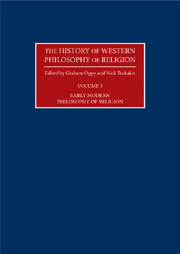Book contents
- Frontmatter
- Contents
- Editorial Introduction
- Contributors
- 1 Early Modern Philosophy of Religion: An Introduction
- 2 Niccolò Machiavelli
- 3 Martin Luther
- 4 John Calvin
- 5 Michel de Montaigne
- 6 Francisco Suárez
- 7 Thomas Hobbes
- 8 René Descartes
- 9 Ralph Cudworth
- 10 Blaise Pascal
- 11 Baruch Spinoza
- 12 John Locke
- 13 Gottfried Wilhelm Leibniz
- 14 George Berkeley
- 15 Voltaire
- 16 The Deists
- 17 Jonathan Edwards
- 18 Thomas Reid
- 19 David Hume
- 20 Denis Diderot
- 21 Immanuel Kant
- 22 Gotthold Ephraim Lessing
- 23 William Paley
- Chronology
- Bibliography
- Index
12 - John Locke
- Frontmatter
- Contents
- Editorial Introduction
- Contributors
- 1 Early Modern Philosophy of Religion: An Introduction
- 2 Niccolò Machiavelli
- 3 Martin Luther
- 4 John Calvin
- 5 Michel de Montaigne
- 6 Francisco Suárez
- 7 Thomas Hobbes
- 8 René Descartes
- 9 Ralph Cudworth
- 10 Blaise Pascal
- 11 Baruch Spinoza
- 12 John Locke
- 13 Gottfried Wilhelm Leibniz
- 14 George Berkeley
- 15 Voltaire
- 16 The Deists
- 17 Jonathan Edwards
- 18 Thomas Reid
- 19 David Hume
- 20 Denis Diderot
- 21 Immanuel Kant
- 22 Gotthold Ephraim Lessing
- 23 William Paley
- Chronology
- Bibliography
- Index
Summary
John Locke was born in the village of Wrington in Somerset, England, on 29 August 1632 and died on 28 October 1704 at Oates, the country estate of Sir Francis and Lady Damaris Masham in Essex. He was born into a family of minor gentry that had puritan sympathies. His father, an attorney, served briefly as a captain in the parliamentary army during the English Civil War, ending his military activity soon after his regiment suffered defeat in battle. Locke was educated at Westminster School, whose headmaster, Richard Busby (1606–95) was a Royalist who managed to retain his position under the Commonwealth and whose loyalty to the Laudian Church of England and its anti-Calvinist theology remained undiminished. There, Locke received a classical education and became proficient in Latin, Greek and Hebrew.
Locke matriculated at Oxford in November 1652. He was elected to a studentship at Christ Church, a position roughly equivalent to an Oxford college fellowship. Locke took his BA in November 1656 and his MA in June 1658. He remained at Christ Church as tutor until 1667. His earliest writings – reading notes inscribed in commonplace books and an interleaved Bible and four disputations that he never published – reveal a young scholar headed for a clerical career (Long 1959; Harrison & Laslett 1971). In the late 1650s Locke's intellectual interest turned also to medicine, and at about that time he came under the tutelage of Robert Boyle (1627–91) (Stewart 1981).
- Type
- Chapter
- Information
- The History of Western Philosophy of Religion , pp. 153 - 166Publisher: Acumen PublishingPrint publication year: 2009
- 1
- Cited by

